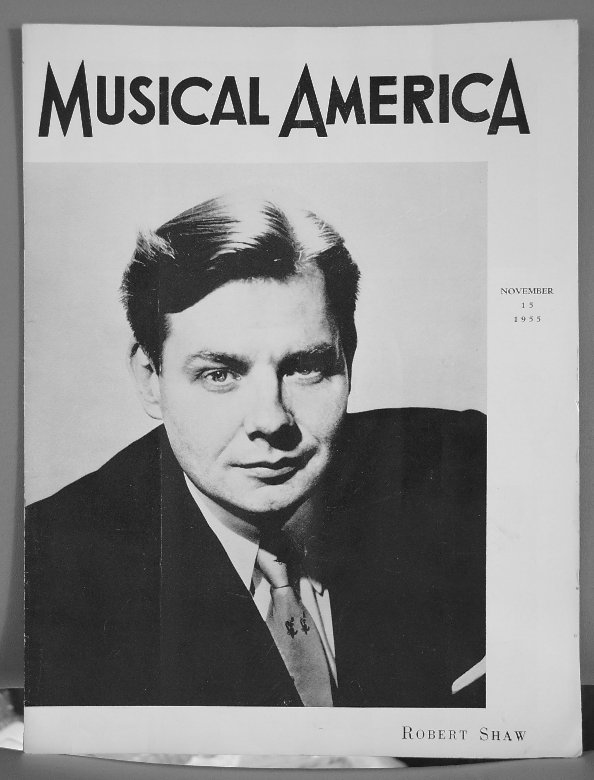

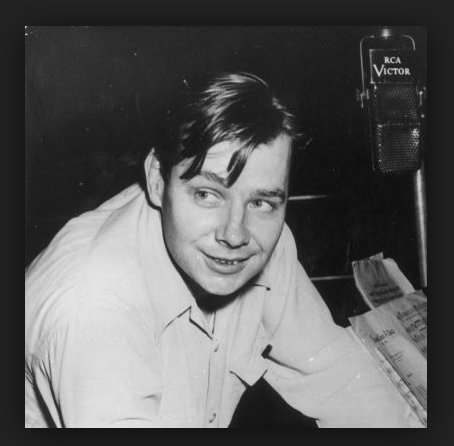 BD: You’ve been involved in
recordings for quite a long time, and recording techniques have changed
and improved considerably. When you’re preparing a chorus or an
orchestra specifically for a recording, do the new techniques affect
the way you prepare it, or do you just let the technicians worry about
the technical stuff?
BD: You’ve been involved in
recordings for quite a long time, and recording techniques have changed
and improved considerably. When you’re preparing a chorus or an
orchestra specifically for a recording, do the new techniques affect
the way you prepare it, or do you just let the technicians worry about
the technical stuff?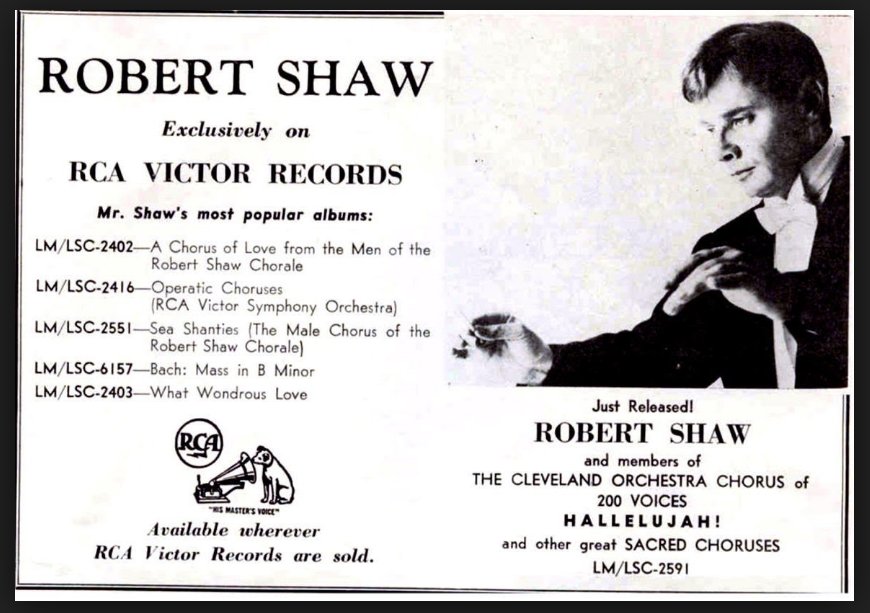 RS: I think generally, though
again it’d be only fair to say I’ve heard fragments. That I can
recall, I’ve never heard any record we’ve made. The reviews are
better than anything we used to get when we were winning Grammys, but I
never listen to any of those. Other than at the final splicing
sessions, I never listened to any of those old recordings or those with
the professional chorale, either. I happened to hear some in
traveling in France this summer, because somebody brought me a tape of
a bunch of old, old titles that we’d done many years ago. Things
like Whiffenpoof Song and the
B-minor Mass — a
mélange of things that Victor put out in one of its commercial
nightmares. It was charming and lots of fun, but it’d been the
first time, I suppose, in twenty to thirty years that I’d heard
anything that we’d made. We also tape our concerts for broadcast
in Atlanta, and other than for our own private study when I’ve had
somebody take something off the air for the archives so I can have it
to refer back to, I’ve never happened to hear one of those broadcasts,
either.
RS: I think generally, though
again it’d be only fair to say I’ve heard fragments. That I can
recall, I’ve never heard any record we’ve made. The reviews are
better than anything we used to get when we were winning Grammys, but I
never listen to any of those. Other than at the final splicing
sessions, I never listened to any of those old recordings or those with
the professional chorale, either. I happened to hear some in
traveling in France this summer, because somebody brought me a tape of
a bunch of old, old titles that we’d done many years ago. Things
like Whiffenpoof Song and the
B-minor Mass — a
mélange of things that Victor put out in one of its commercial
nightmares. It was charming and lots of fun, but it’d been the
first time, I suppose, in twenty to thirty years that I’d heard
anything that we’d made. We also tape our concerts for broadcast
in Atlanta, and other than for our own private study when I’ve had
somebody take something off the air for the archives so I can have it
to refer back to, I’ve never happened to hear one of those broadcasts,
either.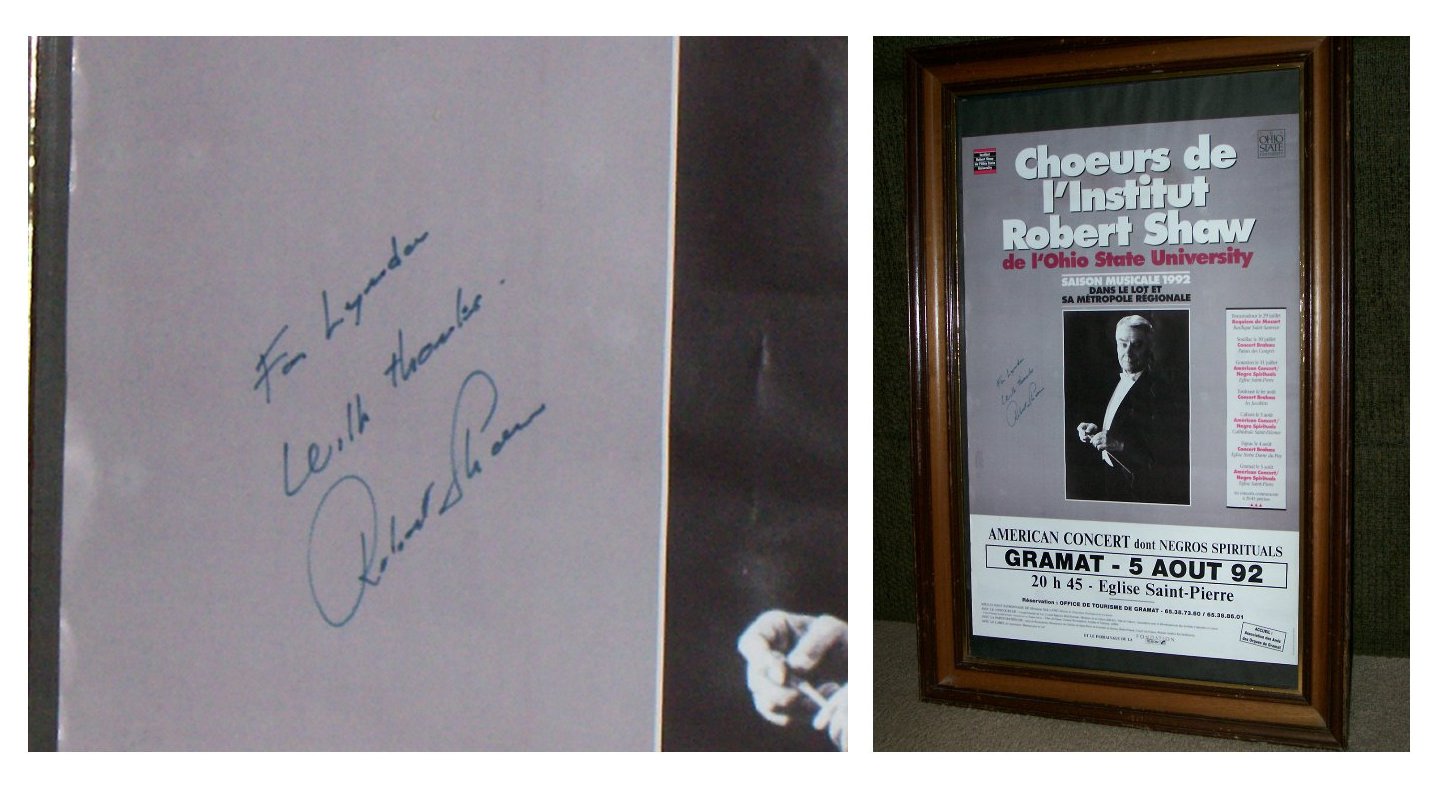
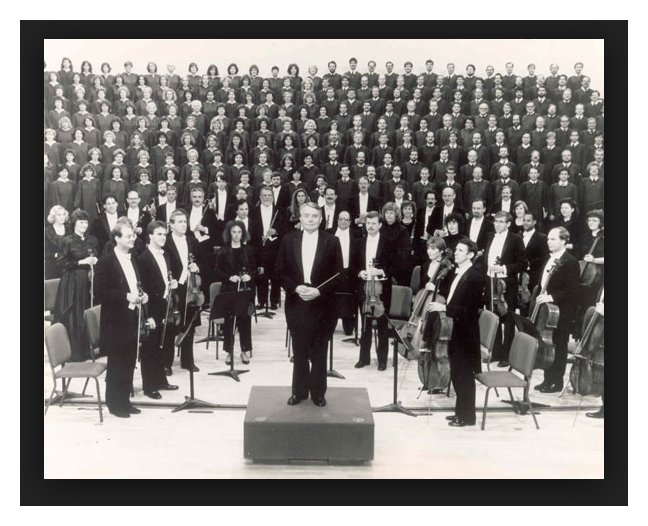 RS: We can talk about two things
— composition and performance. My present listening
to recordings leaves no doubt that England — in the last two decades or
certainly since World War II — is having a remarkable resurgence of
musicological research and performance standards in the choral
art. There are fine choruses in England. They always had an
extraordinary tradition of the festival-type choruses, of the
Mendelssohnian 300- and 400-voice choruses that substantially swamped
most of baroque music for almost centuries. But most recently
they’ve been doing significant musicological research which has allowed
them to bring together small choirs of very expert singers who do
really very, very beautiful work. In general, I think that the
high school and college level of performance in the United States has
been remarkable. Following World War Two, the education of choral
conductors at the University level in the United States reached a
degree of strenuousness and of intellectual distinction which really
passed the preparation of instrumental and orchestral conductors.
Orchestral conductors were still developed in the operatic schooling
grounds and so on, but the degrees offered in choral conducting at our
major universities and in the major conservatories embraced orchestral
conducting and embraced a musicological approach. It was so
necessary because there’d been a good five to six hundred years of
choral music to rediscover. Even Hindemith, whose real concern at
Yale was the development of compositional students following the war,
had his programs of performance. It was largely his group’s
seminars in the choral literature through which he approached his
compositional students. Anyway, I think the performance level is
generally extraordinarily high. There now has grown up a
completely new group of American composers with
whom I have less personal contact than I used to have and still
have. William Schuman, Aaron Copland, Sam Barber and the others
of that generation, some of whom are gone now. [See my Interview with William
Schuman.] With the Atlanta Symphony, we’re undertaking now a
series of commissions, and I suppose fifteen to twenty-five percent of
those commissions will be in the choral-symphonic field. We have
Gian Carlo Menotti and others who are writing works in the
choral-symphonic area for us. [See my Interviews with Gian
Carlo Menotti.] Bill Schuman’s doing one which we
commissioned along with the New York Philharmonic and a couple of other
orchestras. So some of that repertoire is forthcoming if it’s not
with us now, and other people are doing serious commissioning projects,
too. I don’t see any real fecundity as to match, for instance,
that of a Francis Poulenc, just a couple of decades ago, with the
really considerable number of major works which he wrote for symphony
orchestra and chorus, and his a
cappella works as well. Our American composition has not
placed as much attention on the choral repertoire as it did in my
generation and the succeeding generation. That attention now is
on the straight orchestral repertoire. At the same time, I’ve
been so intimately connected with the symphonic field rather than the
choral field. I’ve been a music director of an orchestra for over
forty years now, so my principal attention has been in the instrumental
and orchestral literature rather than the choral literature. The
choral literature has been sort of ancillary, and I may not know as
much as others know in this field. But there’s a considerable
hope that this literature will expand rapidly within the next
half-generation... unless we have some sort of a terrible sociological
catastrophe.
RS: We can talk about two things
— composition and performance. My present listening
to recordings leaves no doubt that England — in the last two decades or
certainly since World War II — is having a remarkable resurgence of
musicological research and performance standards in the choral
art. There are fine choruses in England. They always had an
extraordinary tradition of the festival-type choruses, of the
Mendelssohnian 300- and 400-voice choruses that substantially swamped
most of baroque music for almost centuries. But most recently
they’ve been doing significant musicological research which has allowed
them to bring together small choirs of very expert singers who do
really very, very beautiful work. In general, I think that the
high school and college level of performance in the United States has
been remarkable. Following World War Two, the education of choral
conductors at the University level in the United States reached a
degree of strenuousness and of intellectual distinction which really
passed the preparation of instrumental and orchestral conductors.
Orchestral conductors were still developed in the operatic schooling
grounds and so on, but the degrees offered in choral conducting at our
major universities and in the major conservatories embraced orchestral
conducting and embraced a musicological approach. It was so
necessary because there’d been a good five to six hundred years of
choral music to rediscover. Even Hindemith, whose real concern at
Yale was the development of compositional students following the war,
had his programs of performance. It was largely his group’s
seminars in the choral literature through which he approached his
compositional students. Anyway, I think the performance level is
generally extraordinarily high. There now has grown up a
completely new group of American composers with
whom I have less personal contact than I used to have and still
have. William Schuman, Aaron Copland, Sam Barber and the others
of that generation, some of whom are gone now. [See my Interview with William
Schuman.] With the Atlanta Symphony, we’re undertaking now a
series of commissions, and I suppose fifteen to twenty-five percent of
those commissions will be in the choral-symphonic field. We have
Gian Carlo Menotti and others who are writing works in the
choral-symphonic area for us. [See my Interviews with Gian
Carlo Menotti.] Bill Schuman’s doing one which we
commissioned along with the New York Philharmonic and a couple of other
orchestras. So some of that repertoire is forthcoming if it’s not
with us now, and other people are doing serious commissioning projects,
too. I don’t see any real fecundity as to match, for instance,
that of a Francis Poulenc, just a couple of decades ago, with the
really considerable number of major works which he wrote for symphony
orchestra and chorus, and his a
cappella works as well. Our American composition has not
placed as much attention on the choral repertoire as it did in my
generation and the succeeding generation. That attention now is
on the straight orchestral repertoire. At the same time, I’ve
been so intimately connected with the symphonic field rather than the
choral field. I’ve been a music director of an orchestra for over
forty years now, so my principal attention has been in the instrumental
and orchestral literature rather than the choral literature. The
choral literature has been sort of ancillary, and I may not know as
much as others know in this field. But there’s a considerable
hope that this literature will expand rapidly within the next
half-generation... unless we have some sort of a terrible sociological
catastrophe.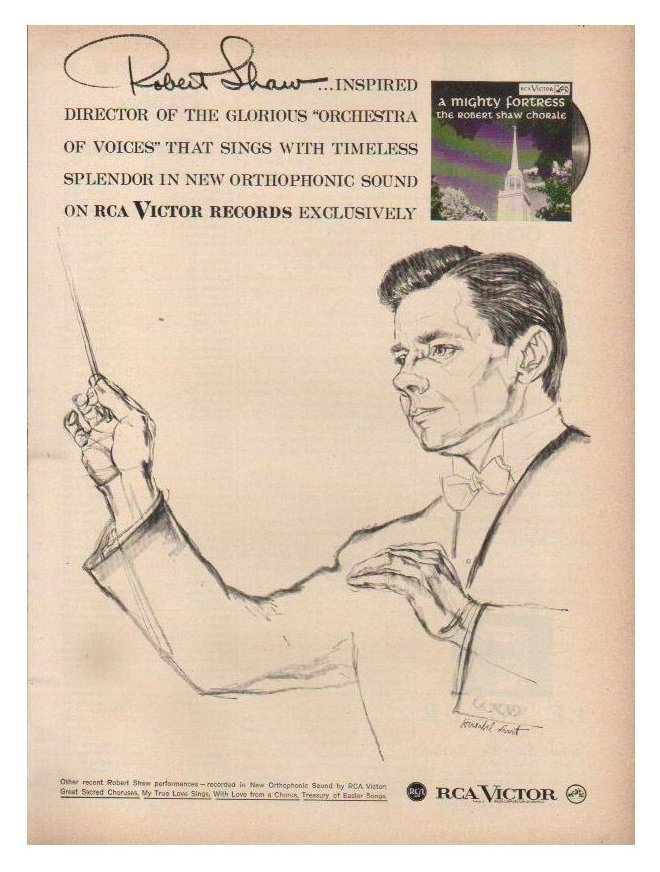
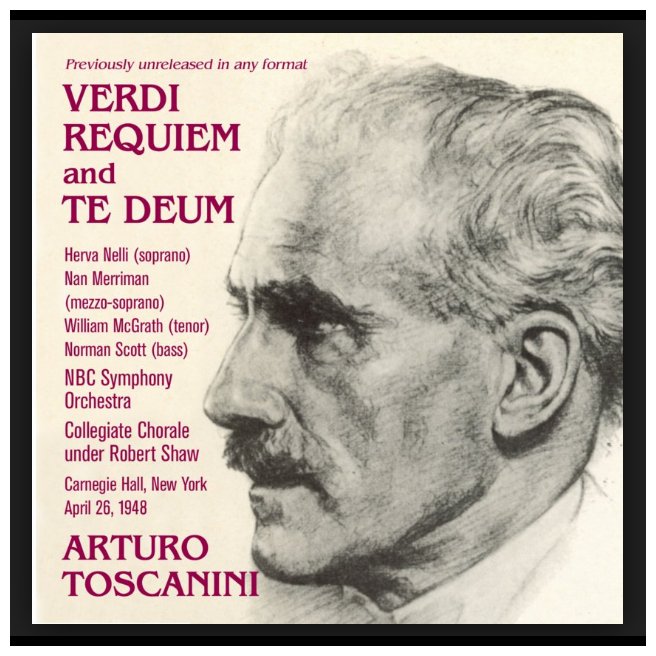 RS: It was always, for us, a
time of great joy and great happiness, and of no sweat and no
strain. All of us had heard legendary stories about his flights
of anger and such, and we witnessed one, but not at our own
expense. So it was a time of felicity and charm. There was
one memorable evening when a group of our choristers — a professional
choir which was a forerunner of our later choir that used to tour under
my name — was appearing on a performance for NBC on Christmas
Eve. I’d phoned Walter, Toscanini’s son, to ask if we might come
up to Riverdale and serenade him after the West Coast broadcast which
Guido Cantelli happened to be conducting that evening. We
rehearsed a bunch of Christmas carols which some of us had previously
recorded, and got together a little half-hour program. We went
and stood outside his door, and before we could begin singing the door
opened and Walter invited us into the house. Toscanini himself,
the maestro, was in a library off the main, large room, which had a
staircase that mounted up to the second floor. He was looking at
wrestling on television, as I remember, and we began singing. He
slowly tottered out, and we kept singing for perhaps thirty
minutes. He was just as sweet an audience as he could possibly
be. Then they opened up a room and fed us all Italian cheeses and
pastries and champagne, and he went around and spent the rest of night
talking to each of the thirty-member chorus who had come up
there. The party broke up at five to six in the morning, and he
just simply spent the night talking with people. But it was
always the most friendly when I was there working, preparing, or going
over a score with him to get his tempi and his changes of tempi, and
what he wanted in terms of dynamics and such at his home. He was
by no means a monster, but a sweet, childlike human being who couldn’t
abide people whom he felt were betraying the music. I think it’s
safe to say that his anger was purified by at least two
qualities. First, he was never sorry for himself; he was always
sorry for the composer. That was a rare quality, and the second
one was that at least in that period of his life he was
childlike. I witnessed a couple of episodes with orchestras and
such at recording sessions, and it was a tantrum which was tempestuous
and soon over. It left only a sort of a shame-faced grin on
everybody’s face when it was over, and he substantially didn’t really
remember it. He was a very pure and sweet man.
RS: It was always, for us, a
time of great joy and great happiness, and of no sweat and no
strain. All of us had heard legendary stories about his flights
of anger and such, and we witnessed one, but not at our own
expense. So it was a time of felicity and charm. There was
one memorable evening when a group of our choristers — a professional
choir which was a forerunner of our later choir that used to tour under
my name — was appearing on a performance for NBC on Christmas
Eve. I’d phoned Walter, Toscanini’s son, to ask if we might come
up to Riverdale and serenade him after the West Coast broadcast which
Guido Cantelli happened to be conducting that evening. We
rehearsed a bunch of Christmas carols which some of us had previously
recorded, and got together a little half-hour program. We went
and stood outside his door, and before we could begin singing the door
opened and Walter invited us into the house. Toscanini himself,
the maestro, was in a library off the main, large room, which had a
staircase that mounted up to the second floor. He was looking at
wrestling on television, as I remember, and we began singing. He
slowly tottered out, and we kept singing for perhaps thirty
minutes. He was just as sweet an audience as he could possibly
be. Then they opened up a room and fed us all Italian cheeses and
pastries and champagne, and he went around and spent the rest of night
talking to each of the thirty-member chorus who had come up
there. The party broke up at five to six in the morning, and he
just simply spent the night talking with people. But it was
always the most friendly when I was there working, preparing, or going
over a score with him to get his tempi and his changes of tempi, and
what he wanted in terms of dynamics and such at his home. He was
by no means a monster, but a sweet, childlike human being who couldn’t
abide people whom he felt were betraying the music. I think it’s
safe to say that his anger was purified by at least two
qualities. First, he was never sorry for himself; he was always
sorry for the composer. That was a rare quality, and the second
one was that at least in that period of his life he was
childlike. I witnessed a couple of episodes with orchestras and
such at recording sessions, and it was a tantrum which was tempestuous
and soon over. It left only a sort of a shame-faced grin on
everybody’s face when it was over, and he substantially didn’t really
remember it. He was a very pure and sweet man.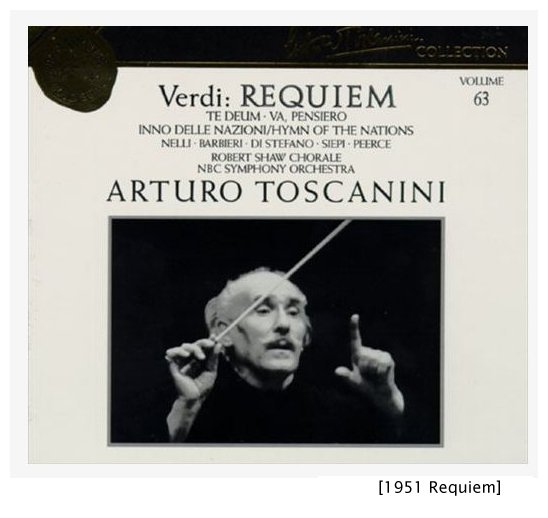 RS: No, I guess not. I
don’t happen to have a discography of my own things, though I’m looking
now in my studio and I suppose there are 115 records or so that I’ve
made, and there have to be one or two of them with Toscanini. But
we were doing this for broadcast, and it was substantially the same
thing. One could wish in retrospect, that not so much of that
broadcast had been committed to Studio 8H at NBC, and a few more
recording sessions were given to Carnegie Hall.
RS: No, I guess not. I
don’t happen to have a discography of my own things, though I’m looking
now in my studio and I suppose there are 115 records or so that I’ve
made, and there have to be one or two of them with Toscanini. But
we were doing this for broadcast, and it was substantially the same
thing. One could wish in retrospect, that not so much of that
broadcast had been committed to Studio 8H at NBC, and a few more
recording sessions were given to Carnegie Hall.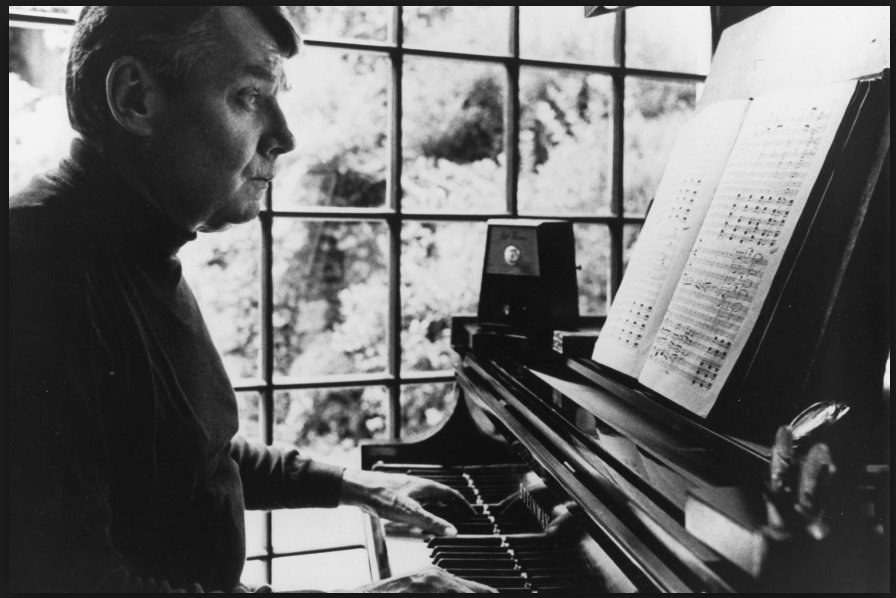 RS: Pick a great school.
That’s important. Next, I’ll speak from my own frailties.
Develop keyboard facilities because they help enormously in the
accumulation of intelligence. One can simply study scores so much
faster than one can without pianistic facility. The third thing
would be don’t wait for an appointment to be the musical director of
some group, but start your own. Always have a group of some sort
functioning, whether it’s six high school kids at an evangelical church
in southwest Louisiana, or whatever, but don’t be without a performing
instrument.
RS: Pick a great school.
That’s important. Next, I’ll speak from my own frailties.
Develop keyboard facilities because they help enormously in the
accumulation of intelligence. One can simply study scores so much
faster than one can without pianistic facility. The third thing
would be don’t wait for an appointment to be the musical director of
some group, but start your own. Always have a group of some sort
functioning, whether it’s six high school kids at an evangelical church
in southwest Louisiana, or whatever, but don’t be without a performing
instrument.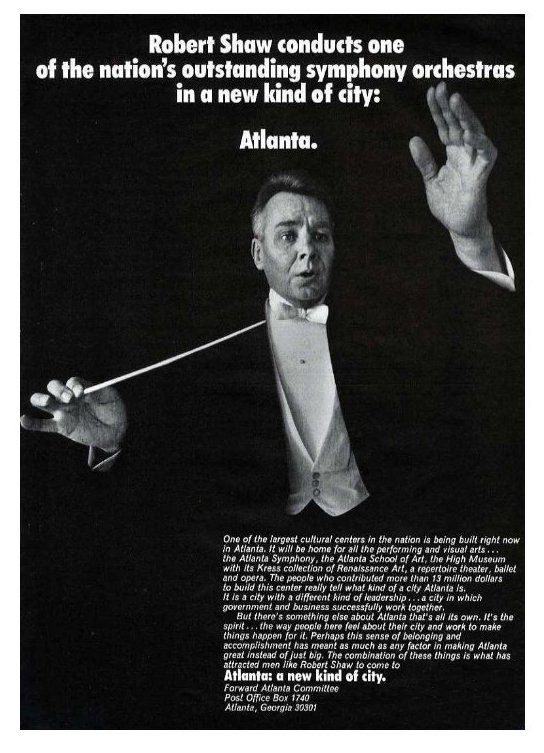
|
Robert
Shaw (Conductor)
Born: April 30, 1916 - Red Bluff, California, USA Died: January 25, 1999 - New Haven, USA In his long career which spanned six decades and four cities, Robert Shaw transformed choral conducting into an art, and nearly single-handedly raised it to a new level. For more than half a century he set the standard of excellence for choral music, enjoying a status of patriarch of vocal musical interpretation in the USA. 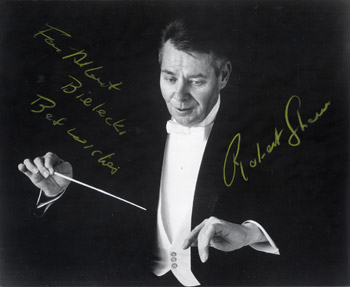 Robert (Lawson) Shaw came from a clerical family. His
father and grandfather were ministers. More importantly, perhaps, his
mother sang in church choirs. In school his serious interests were in
philosophy, literature, and religion, but at Pomona College he did join
the glee club. Then, in a chain of events right out of a Warner
Brothers backstage musical, Shaw was asked to take over the choir for
an ailing faculty leader the same year that Fred Waring happened to be
making a film on the campus. Waring was impressed, asked him to go to
New York to develop a glee club for him. Robert (Lawson) Shaw came from a clerical family. His
father and grandfather were ministers. More importantly, perhaps, his
mother sang in church choirs. In school his serious interests were in
philosophy, literature, and religion, but at Pomona College he did join
the glee club. Then, in a chain of events right out of a Warner
Brothers backstage musical, Shaw was asked to take over the choir for
an ailing faculty leader the same year that Fred Waring happened to be
making a film on the campus. Waring was impressed, asked him to go to
New York to develop a glee club for him.As early as 1943, the National Association of Composers and Conductors cited him as "America's greatest choral conductor." Arturo Toscanini was conducting Beethoven's Ninth Symphony with his NBC Symphony Orchestra. After hearing the chorus, which had been prepared by Robert Shaw, Toscanini turned to his players and said, "In Robert Shaw I have at last found the maestro I have been looking for." With the founding of the Robert Shaw Chorale in New York in 1948, his fame and influence in the field became second to none in the world. He led the group on extensive tours throughout Europe, the Soviet Union, Latin America, and the Middle East under the auspices of the State Department. For his esteemed Chorale, he commissioned pieces from the leading composers of the day including Béla Bartók, Darius Milhaud, Benjamin Britten, and Aaron Copland. Shaw also served as music director of the San Diego Symphony Orchestra until he was recruited by George Szell to conduct the choral section of the Cleveland Symphony Orchestra. He served under Szell for 11 years. In 1967 Robert Shaw accepted the directorship of the Atlanta Symphony Orchestra, and saw it grow from a local band of 60 part-time amateur musicians to a fine major-league orchestra. When he retired in 1988, the orchestra comprised 93 professional players. He also established a magnificent choral adjunct and led the combined forces in many definitive recordings of the symphonic-choral music literature, eleven of which won Grammy awards. Shaw won four other Grammy awards and was nominated for two more. Earlier in his career, he recorded the first classical album on the RCA label to sell over a million copies. The recipient of 40 honorary degrees and citations including the George M. Peabody Medal, a Guggenheim Fellowship, and the National Medal of Arts, Robert Shaw was inducted into the American Classical Music Hall of Fame at New York's Julliard School of Music. In 1991, he received the Kennedy Center Honors, America's highest award for artistic achievement. He founded the Robert Shaw Institute which encourages the creation and production of choral art and sponsors the Robert Shaw Festival. |
This interview was recorded on the telephone on August 24,
1985. Segments were used (with recordings)
on WNIB in 1986, 1987, 1991, 1996 and 1999. It was transcribed
and posted on this
website in 2013.
To see a full list (with links) of interviews which have been transcribed and posted on this website, click here.
Award - winning broadcaster Bruce Duffie was with WNIB, Classical 97 in Chicago from 1975 until its final moment as a classical station in February of 2001. His interviews have also appeared in various magazines and journals since 1980, and he now continues his broadcast series on WNUR-FM, as well as on Contemporary Classical Internet Radio.
You are invited to visit his website for more information about his work, including selected transcripts of other interviews, plus a full list of his guests. He would also like to call your attention to the photos and information about his grandfather, who was a pioneer in the automotive field more than a century ago. You may also send him E-Mail with comments, questions and suggestions.